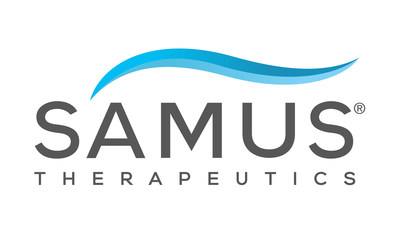Samus Therapeutics, Inc. (“Samus” or the “Company”), today announced a poster presentation addressing the Company’s Phase 1 study evaluating orally administered PU-H71 with ruxolitinib in patients with myelofibrosis no longer fully responsive to orally administered ruxolitinib.
|
BOSTON, Dec. 9, 2019 /PRNewswire/ -- Samus Therapeutics Inc. ("Samus" or the "Company"), a privately held, Boston-based, biopharmaceutical company developing epichaperome inhibitors to intervene in pathological processes and initiate the degradation of disease-associated proteins, today announced a poster presentation addressing the Company's Phase 1 study evaluating orally administered PU-H71 with ruxolitinib in patients with myelofibrosis no longer fully responsive to orally administered ruxolitinib. The poster is being presented today at the American Society of Hematology 2019 Annual Meeting in Orlando. "Preclinical data show us that the activity of mutated JAK2 is tightly regulated by epichaperomes, a complex network of proteins which forms under cellular stress, such as in cancer, and nucleates on heat shock protein 90," commented Barbara Wallner, Chief Scientific Officer of Samus Therapeutics. "PU-H71 offers a novel approach to address frontline treatment of myelofibrosis in combination to potentially improve outcomes." The combination multicenter Phase 1b study is designed to assess the safety, tolerability, pharmacodynamics, and preliminary efficacy of orally administered PU-H71 in myelofibrosis, for which the U.S. Food and Drug Administration granted Orphan Drug designation in 2018. The study will enroll patients who have active disease and have been receiving ruxolitinib therapy for at least 3 months. The study employs a standard 3+3 dose escalation design beginning with 50 mg/day of PU-H71 to determine the maximum tolerated dose (MTD). Enrollment in the study is now ongoing in the United States. "Early study of intravenously administered PU-H71 in myelofibrosis in combination with ruxolitinib identified a safe and tolerable dose and we redirected our efforts to oral administration," said Dick Bagley, President and Interim Chief Executive Officer of Samus Therapeutics. "We believe that the combination of PU-H71 and ruxolitinib could deliver added clinical benefit in this extraordinarily difficult to treat hematological malignancy." Details for the ASH 2019 presentation are as follows: Title: Phase 1b Study of the Epichaperome Inhibitor PU-H71 Administered Orally with Ruxolitinib Continuation for the Treatment of Patients with Myelofibrosis About Samus Therapeutics This press release contains certain forward-looking information about Samus Therapeutics, Inc. that is intended to be covered by the safe harbor for "forward-looking statements" provided by the Private Securities Litigation Reform Act of 1995, as amended. Forward-looking statements are statements that are not historical facts, and in some cases can be identified by terms such as "may," "will," "could," "expects," "plans," "anticipates," "forecasts," and "believes." These statements include, but are not limited to, statements regarding the progress, timing and results of preclinical and clinical trials involving the Company's drug candidates, and the progress of the Company's research and development programs. All such statements are subject to certain risks and uncertainties, many of which are difficult to predict and generally beyond the control of the Company, that could cause actual results to differ materially from those expressed in, or implied by, the forward-looking statements These risks and uncertainties include, but are not limited to whether any of our therapeutic candidates will advance further in the preclinical or clinical trials process and whether and when, if at all, they will receive final approval from the U.S. Food and Drug Administration or equivalent foreign regulatory agencies, whether our products will be successfully marketed if approved; the strength and enforceability of our intellectual property rights; and competition from other pharmaceutical and biotechnology companies. While Samus may elect to update these forward-looking statements at some point in the future, it specifically disclaims any obligation to update or revise any forward-looking-statements contained in this press release whether as a result of new information or future events, except as may be required by law.
SOURCE Samus Therapeutics, Inc. |





